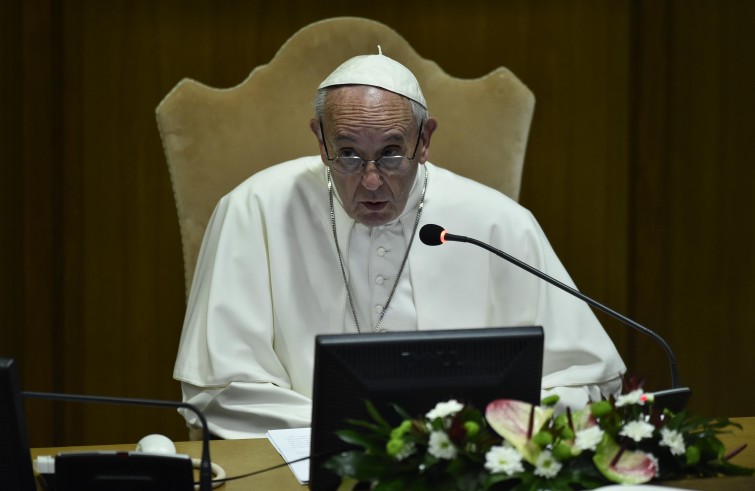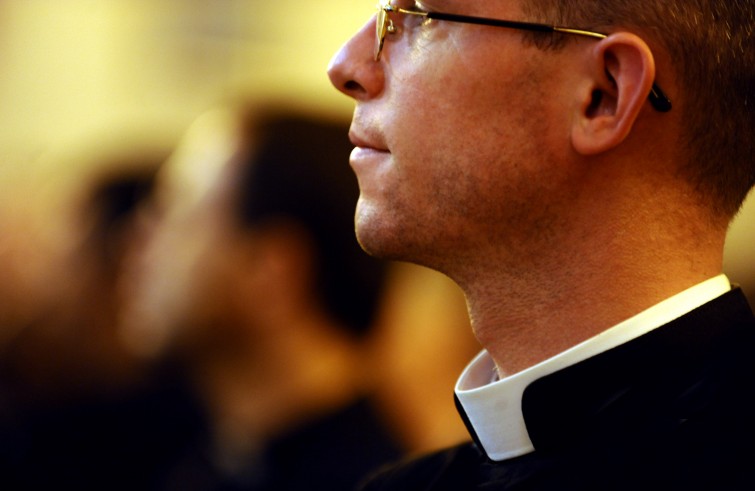General Assembly
Pope Francis opened the 69th General Assembly of Italian Bishops dedicated to “Renewal of the Clergy”, with an invitation to listen “to some of the many parish presbyters dedicated to our communities”. It is not a “systematic reflection on the figure of the presbyter”, but three questions, which stem from the face of the presbyter and indicate “a threefold sense of belonging: to the Lord, to the Church, to the Kingdom”

Three questions to reflect on “three” spheres that priestly ministry “belongs to.” “To the Lord, to the Church, to the Kingdom”. In the opening address to participants in the 69th general assembly of the Italian Bishops’ Conference (CEI), devoted to “renewal of the clergy”, (Vatican, May 16-19), Pope Francis did not wish to offer “a systematic reflection on the figure of the presbyter.” Rather – after having greeted with impromptu remarks newly ordained priests – he urged to adopt “a reversed perspective”, listening to “to some of the many parish priests that spend themselves in our communities”:
“May we allow the face of one them to be seen with the eyes of our heart and may we ask ourselves with simplicity: what gives flavour to his life? For whom and for what does he commit his service? What is the ultimate reason for his self-giving?”
The answers to these questions, the Pope said, “will help you identify also formative proposals in which to invest with courage.”
For, as Cardinal CEI president Angelo Bagnasco has reminded, welcoming the Pope, “we know how much the faithful have faith in us; in our mission as the first who proclaimed the love of God, as shepherds called to have at heart all the peoples and communities entrusted to our pastoral guidance.”
Belonging to the Lord. The first sphere is “belonging” to the Lord, that gives flavour to priestly life, despite the “harshness” of the present “cultural environment.” “Against this backdrop – Francis said – the life of our presbyters becomes eloquent, because it is different, alternative. Just like Moses, the presbyter is one who approached the fire and let the flames burn his ambitions for power and career. He also set ablaze the temptation to view himself as a “devout,” who takes refuge in a religious intimism that is far from spiritual.”
The presbyter, he added, “is not a bureaucrat or one of many officials within the institution; he is not consecrated as an office worker, not is he driven by efficiency. He does not seek earthly assurances or honorific titles, which lead him to rely on man. In his ministry he does not ask for more than he really needs, he is not concerned with binding to himself those entrusted to him. His simple, essential and ever-welcoming lifestyle make him credible in the eyes of people and brings him closer to the humble, in a spirit of pastoral charity that furthers freedom and solidarity. At the service of life,
he walks with the heart and at the pace of the poor.
He is enriched by contact with them. He is a man of peace and reconciliation, a sign and instrument of God’s tenderness.” The “secret” of the presbyter ultimately lies in the fact of belonging to the Lord, that makes him “alien to the corruption of spiritual mundaneness”.
Belonging to the Church. Belonging to the Church is a litmus test for the presbyter. In fact, the Pope said, “the presbyter is a presbyter inasmuch as he feels part of the Church, of a true community whose path of life he shares.
The faithful people of God remain the womb
whence he was delivered, the family he is involved with, the home he is sent to. This joint belongingness, that originates in Baptism, is the breath that liberates from the isolation and the captivity of self-referentiality.” In this respect, Francis mentioned dom Hélder Câmara: “when your ship begins to put down roots in the stagnant water by the quay put out to sea!” He added: “Set sail! And first of all, not because you have a mission to fulfil but because you are structurally a missionary.” Belonging to the people of God, the Holy Father went on, “is the salt in the life of the presbyter; it makes his distinctive trait be communion lived with the laity in relationships that enhance everyone’s participation.” Moreover, “it is vital for a presbyter to rediscover himself at the presbytery cenacle.” It is an experience that “is free from narcissism and clerical jealousy; it fosters mutual esteem, support and mutual benevolence; it furthers fraternal, concrete communion.”

In his remarks on belonging to the Church, Francis spoke of “the management of structures and economic assets”, which is a chapter of the CEI Assembly.
“See through the eyes of the Gospel and avoid the burden of a conservational form of pastoral care that hinders the constant renewal brought about by the Holy Spirit”. “Only keep what is required to foster the experience of faith and charity of the people of God”
Belonging to the Kingdom. Thus, the Pope spoke of the third sphere the presbyter belongs to: belonging to the Kingdom. The presbyter, the Pope said, is a man of Easter, whose
Eyes are fixed on the Kingdom,
towards which he feels human history moving despite the delays, obscurities and contradictions. The Kingdom – Jesus’ vision of mankind – is his joy, the horizon that enables him to relativize everything, to mitigate worries and anxieties, to avoid illusions and pessimism; to cherish peace in his heart and disseminate it with his gestures, his words, his behaviour.”

These three spheres the presbyter belongs to, the Pope said in his concluding remarks, “ought to be cherished and fostered like riches in clay pots!” The Pope’s final invitation to the bishops: “Be deeply aware of this responsibility; take good care of it with patience, dedicating to it your time, hands and heart. Together with your presbyters may you be able to fulfil the service that has been entrusted to you and with which you participate in the mystery of Mother Church.”